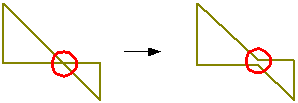Simplifying object geometry
The simplify geometry tool can be used to correct and thin a selection of polygon objects, especially objects imported from external sources.
Polygons and polylines can be imported into the software from external sources to perform various aspects of model building; these procedures often involve the calculation of intersections.
It is often the case that geometry looks absolutely fine when displayed on paper or on the screen, but it may contain self-intersecting regions, or (nearly) coincident points which will be deleterious to the speed and accuracy of algorithms that will process the geometry.
Cleaning and thinning will remove points that are exceptionally close together, join segments in linear regions, and fix self intersections. The benefit of this is two-fold:
- It greatly increases the accuracy and robustness of intersection calculations.
- Modelling procedures that calculate intersections will be much faster.
It is strongly advised to clean and thin geometry as soon as possible after importing it from an external source.
If the imported geometry is very large and complex, it is highly recommended to follow these two steps in the order described below:
- Thin to remove (nearly) coincident points and to anneal consecutive segments that are nearly colinear.
- Clean/correct to remove self intersections.
Thinning is used to reduce the number of object vertices, potentially reducing data size significantly, thereby improving performance.
For example:
![]()
Example of Thinning
Correction is used to edit the geometry of self intersecting polygons in such a way that the shape no longer intersects itself.
For example:


Examples of correction of self intersecting polygons
To carry out simplification of objects:
- Select the objects to be simplified
- Choose Selection | Simplify geometry . The Simplify Geometry dialog is displayed.
- On the Simplify Geometry dialog, select the required options:
- Check the Thinning box to remove vertices from selected objects according to the thinning options defined:
- Minimum Segment Length - Vertices at a distance less than the minimum segment length from another vertex will be removed by the thinning process.
- Triangle Height - Vertices forming a triangle height less than the triangle height specified will be removed by the thinning process.
- Maximum Change in Area - If as a result of thinning, the change in area of an object is greater than the maximum change in area defined; no thinning will be carried out on that object.
- Check the Correction box to correct self intersecting objects.
- Click OK.

Changes made to network objects as a result of the thinning / correction process cannot be undone. It is recommended that you use a newly checked out version of your network.
Multi-part polygons
Correction of multi-part polygons cannot currently be carried out using the simplify geometry functionality in InfoWorks WS Pro.
If a multi-part polygon is found during the correction process, the polygon will be reported as having 'Bad Geometry' in the log. This message indicates that the shape cannot be processed; it does not necessarily mean that the polygon has not been defined correctly. No correction will take place, although thinning will be carried out as normal.
Log
A log is produced including correction and thinning results of all selected objects.
The log will also show error messages and warning messages.
'Bad Geometry' messages are displayed for polygons that could not be processed by the simplification tool. Examples include multi-part polygons (see above), and polygons with zero area.
The log is saved temporarily in the working folder as an html file. When the log is closed in InfoWorks WS Pro, the log file in the local root will be removed. To view the log at a later date, save the file in the local root to another directory and/or under a different name.
